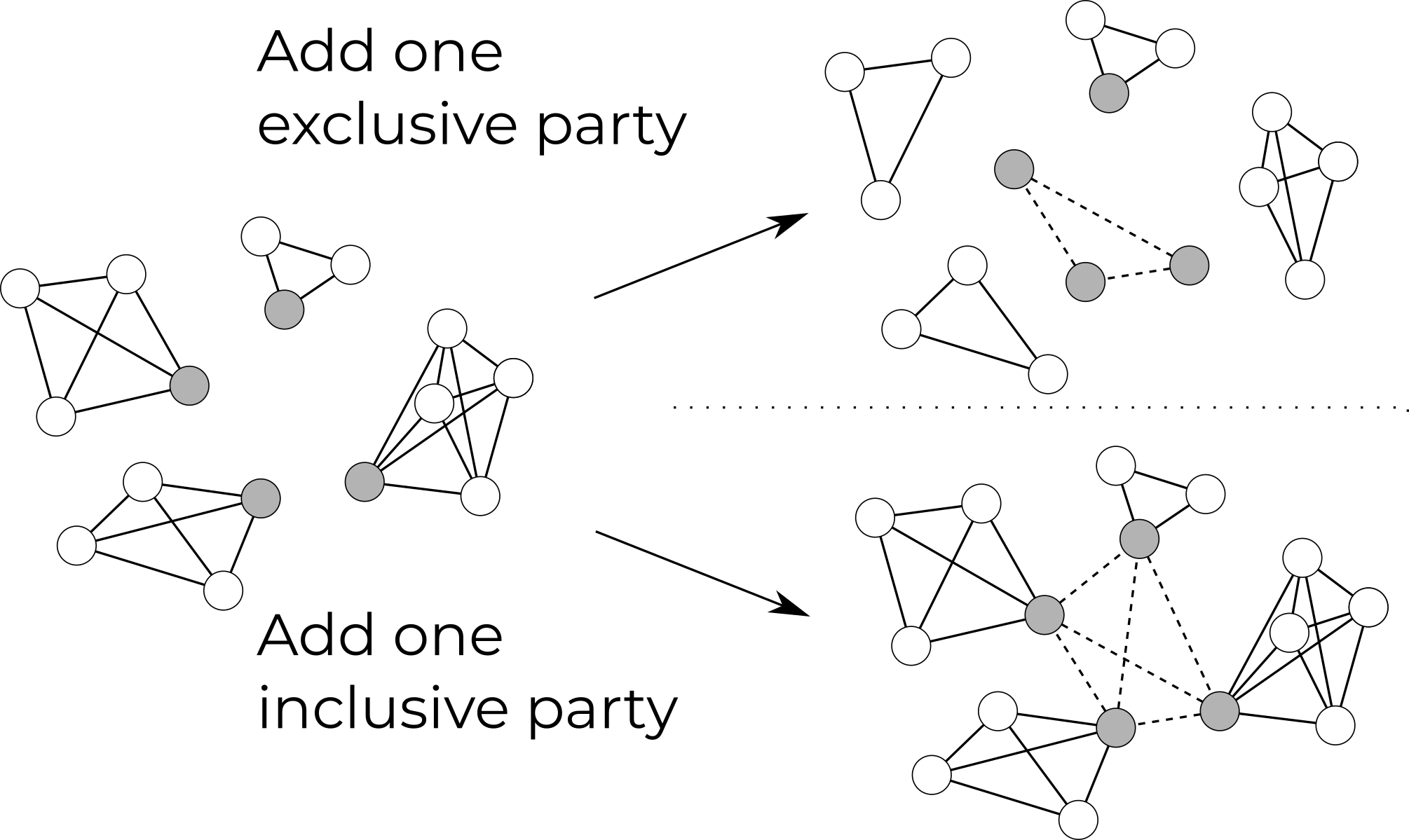
Exclusive Parties
Organisations
Our society consists of individuals. These individuals can organize themselves in structured groups, named organisations. There exist many different organisations, each with their specific size, structure and scope: e.g. businesses, sport clubs, religious organisations, civil society organisations, the state and political parties. Because we interact on a daily basis with organisations, the interactions between organisations has a profound effect on how individuals interact with each other. It is my intent in this blog to explain the concept of exclusivity/inclusivity on organisations and, by means of thought experiment, to predict the impact of this property of political parties to our democracy.
Exclusivity
I will define exclusivity as follows: an organisation is exclusive if individuals that contribute to the organisation, within a certain scope, are restricted from contributing to another organisation.
Most organisations are inclusive relative to each other. If you buy a Mercedes, you can also buy a BMW (assuming you have the funds). If you joined a badminton club, you can still play baseball in another club. The worshipping of Zeus does not prevent you from worshipping Athena.
Some organisations are exclusive to each other. If you are a Real Madrid fan, you are probably not a FC Barcelona fan (Spanish soccer clubs). If you worship Jezus, you probably aren’t a Jew.
Exclusivity has a specific scope. Yes, you can buy both a BMW and Mercedes, but you probably will not be able to work for BMW and Mercedes as an employee simultaneously. Hence, BMW and Mercedes are mutually exclusive as employers, but not as car sellers. Real Madrid fans are exclusively fans to their club, except when they cheer for their national team in a world cup. It is therefore reasonable to state that fans are most of the time only exclusively fans for a team within a competition.

Political parties
Organisations are also essential for the working of large democracies. However, political parties were not foreseen to have a significant role by the founding fathers in the US constitution. In fact, they even feared these factions would tear the nation apart. Despite this, political parties became the dominant type of organisation in representative democracies. Currently, all political parties that I am aware of are exclusive within politics: If you are a democrat, you cannot be a republican and vice versa. There are other political organisations, like congressional caucuses and groups of civil society that are inclusive, but they are currently far less powerful compared to political parties.
Essentially, this means that having an exclusive party system can be viewed as making a projection of our multidimensional political goals to a single partisan dimension. If you have N inclusive parties, you can choose to support (or not) these N parties independently of each other. This gives you 2^N combinations of choices. If we would like to give a similar number of choices in an exclusive system, we need 2^N number of parties, which is practically impossible to achieve. Therefore, the exclusive system deprives citizens of their political freedom.
Consequences of exclusive parties
- Exclusivity within a scope forces the exclusive organisation to supply all needs within that scope.
- Therefore parties cannot really specialize – they need to have opinions on all issues.
- It creates a high entry threshold for new parties – hence it favors centralized systems and becomes more fragile.
- Because they need opinions on all issues, models (e.g. ideologies) that efficiently generate opinions on a wide variety of topics, become very attractive.
- If an exclusive party needs to form a coalition, making compromises with N coalition partners becomes exponentially hard. Hence, the exclusive party system is not scalable.
- The exclusive party system is by definition a zero-sum game. Together with its increased segregation within politics, it will increase polarisation. In contrast, an inclusive party system would be a non zero-sum game: support of citizens can be shared by different parties, therefore benefiting both parties.

Risk of varying scopes
While party exclusivity is fairly constrained in a good functioning democracy, changing the scope of exclusivity will hamper its functioning. In late 19th and early 20th century for example, Belgium, the Netherlands and Austria were increasingly segregated along political lines, in a process called pillarization, in which people of different political backgrounds went to different schools, read different papers, played sports in different clubs, etc. More extreme exclusivity, as in dictatorships, is not only expanded from the individual to the nation – other parties are forbidden – but being a member of the ruling party will increase your chance of success in all types of areas, e.g. business. In the most extreme case, totalitarian rule, all other organisations are either coerced to pay lip service to the regime (e.g. for the nazi’s: from labor unions to singing bird breeder groups) or are forbidden.
Hurdles for the inclusive party system
In order to successfully implement an inclusive party system, two major hurdles need to be overcome:
- Use an electoral system that measures approval of one party independent of one’s approval for another party. In other words, the question should be do you prefer “party A” over “not party A” instead of “party A” over “party B”. This excludes rank-based voting system.
- Use of a representative system in which parties have an incentive to specialize and can not use their power easily in other issues.
I will go into more detail in how I would tackle these problems in future blog posts, or you can already read it in my book, The Flaws That Kill Our Democracy.
